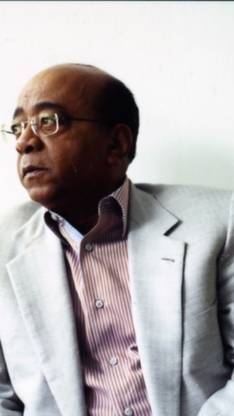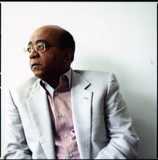Mo Ibrahim / Africa
Life lines
Sudanese-born Mo Ibrahim oversaw the launch of the UK’s first mobile phone network in the 1980s before taking his telecom expertise back to his home continent. Celtel, the company he founded, was sold for €2.48bn in 2005. He is now facing a bigger challenge: promoting good governance in Africa.

Few former Marxists make their way on to rich lists – but Mo Ibrahim is used to being an exception. The son of a Sudanese cotton-trader, he grew up in Cairo, and in the early 1980s – as technical director of Cellnet, British Telecom’s then wireless arm – oversaw the launch of the UK’s first mobile phone network.
He made his money, however, by entering a territory that was being neglected by international telecoms firms: Africa. The company he launched in 1998, Celtel, now operates in 15 African countries and has just unveiled the world’s first multinational network – the One Network – with no roaming charges.
In a continent where fixed-phone lines are rare and infrastructure is poor, mobile phones are vital. The number of users rose from 7.5 million in 1999 to more than 82 million in 2005. According to the International Telecommunication Union, handset use is growing by more than 65 per cent a year.
Ibrahim sold Celtel for €2.48bn in 2005, although he is still chairman. He is now using his wealth to attempt something even more difficult – changing the way African countries are ruled. The London-based Mo Ibrahim Foundation aims to promote “good governance”.
A governance index, devised by a Harvard academic, will rate all 53 African nations on the strength of their democracy, rule of law and economic development. A prize – of $5m (€3.65m) over 10 years and $120,000 (€88,000) every year after that – will go to a democratically elected African leader who has stepped down from office in the past three years. The first winner will be announced in October.
Monocle: Why do you think that major international phone companies were unwilling to invest in Africa?
Mo Ibrahim: Nobody wanted to work in Africa. People were afraid of the continent. The big operators were not keen. They were worried about lack of rule of law and also about corruption.
M: Why did you not share those fears?
MI: We thought this did not reflect the situation in Africa. Africa is not that bad. It is investors who cause the most problems with corruption. We vowed not to offer or take a single bribe. Yes, sometimes we’ve had problems but that’s normal in business.
M: What hurdles did Celtel’s launch pose?
MI: The challenges were more technical and project-oriented. Building infrastructure in the UK is much easier. You have power supply everywhere, roads everywhere. In a country like [the Democratic Republic of] Congo you have to build your own backbone. You have to have power generators at every site, then you need diesel for all the generators, someone at every site for when something goes wrong. You have to transport equipment on animals or up rivers.
M: Did any African countries have strong landline networks?
MI: No. Most were terrible. When we first went to Congo they had 3,000 fixed phone lines. Half of them didn’t work. Today they have four million mobile phones and seven operators. It is one of the cheapest places in the world to make a phone call. Competition is cut-throat.
M: Why had telecoms failed to take off?
MI: Across Africa there was a lack of capital and a lack of investment in the sector. But the need was there and once the right policies were put in place – liberalisation – it was possible for us to make the most of the opportunity.
M: How has the growth in mobile phones helped African economies?
MI: It can be a real booster to the country. We are the largest taxpayer in all 15 countries we operate in in Africa. Fifty-two per cent of our revenue goes to governments. You can forget about the jobs we have brought in, the service we have created. If you just look at the amount of money we provide to the government, you can see how important we are. Mobile phone networks have been a great success story for Africa.
M: Has the enormous growth in the mobile phone market in Africa surprised you?
MI: I must admit I never appreciated the depth of that market. It took me by surprise. It is amazing how people on lower incomes took to this so quickly.
M: Why do you think that has happened?
MI: The financial advantages to them are enormous. It is all about information. People can find out what the real price of their produce is – they don’t have to take the word of a middleman. Suddenly these guys have a voice. That was humbling. It is amazing how quickly things change. It gives me hope for the continent.
M: Why did you introduce One Network?
MI: Roaming in Europe is a big rip-off. A 10-second call to my voicemail and it costs me more than a euro. There is no reason for it. If someone is in Kenya near the border with Tanzania and they make a call just across the border it costs us less than if they were to call someone up in the north of Kenya. The costs of taking it across the border are minimal.
M: Africa’s combined population is lower than that of either India or China. What problems does this cause?
MI: One problem we have in Africa is scale. If we reduce the scale we become more viable. African countries are always going back to the mother country. Africa must trade with itself, talk to itself. That’s why Europe has the EU. In Europe people trade with each other. Who are we in Africa to think we can do it by ourselves? We also need economic union.
M: In terms of governance what concerns you most about Africa?
MI: The suffering that we are experiencing is unacceptable. There are problems in two main areas – good governance and development. If we manage to achieve these we will have no problems with disease or education.
M: How big a problem is corruption?
MI: All the time people talk about corruption as if it is only a problem in Africa. But corruption is not like masturbation – it is a two-way thing. How many prosecutions have we seen in the West? Tell me, how many times has a company operating in Africa been prosecuted for corruption? Not once. I am fed up with the hypocrisy.
M: Why the need for a governance index?
MI: There is universal agreement that good governance is essential in Africa for us to move on. We are all trying to promote it in Africa but it is important to first define what is “good governance”. We should do it in an objective way.
M: Why should African leaders be, effectively, bribed to do their job?
MI: Are you telling me a given professor or academic is only doing their job because they might win the Nobel Prize? It is part of the human gene to want to be recognised. Why don’t we honour these guys? We are doing it for achievement. We are honouring people who are dealing with really difficult issues.
M: How do African leaders differ from those in the West?
MI: What is it that keeps a western leader up at night, apart from war? Is it whether the queue for hip replacements is four months, not three? Is it inflation might go from 3 per cent to 3.5 per cent? Now look at what an African leader is dealing with. Malaria killing millions, unemployment at 20 or 30 per cent. Only half his people have access to clean water. The challenges facing a leader in a poor country are far tougher.
M: Do you think the foundation’s focus on governance may prove controversial?
MI: I am an African. It is necessary for an African to do this. No one can call me an imperialist. What I am doing has to be done by an African. It is up to us.
M: You’re going to step down as chairman of Celtel this year. Will you miss it?
MI: I am quite comfortable. I feel my job is done.
Curriculum Vitae
Mo Ibrahim
1946 Born in Sudan
1968 Graduates from the University of Alexandria
1968-74 Works at Sudan’s state telecoms company
1976-83 Research fellow at the University of Birmingham in Britain
1983 Technical director at Cellnet, at the time, the wireless subsidiary of British Telecom
1998 Launches Celtel, now Africa’s largest mobile phone network
2005 Sells Celtel for €2.48bn
2006 Establishes the Mo Ibrahim Foundation, which promotes good governance in Africa. Lives in London


